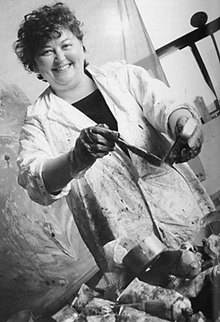Joyce Wieland: Difference between revisions
m →External links: Remove stub template(s). Page is start class or higher. Also check for and do General Fixes + Checkwiki fixes using AWB |
Darlakitty (talk | contribs) m →Further reading: Adding references |
||
| Line 35: | Line 35: | ||
==Further reading== |
==Further reading== |
||
*Johanne Sloan: ''Joyce Wieland's the Far Shore'' (Canadian Cinema), Univ of Toronto Press, 2010, ISBN 1-4426-1060-3 |
*Johanne Sloan: ''Joyce Wieland's the Far Shore'' (Canadian Cinema), Univ of Toronto Press, 2010, ISBN 1-4426-1060-3 |
||
*Iris Nowell. ''A Life in Art'', Toronto: ECW Press, 2001. ISBN 1-55022-476-X |
|||
==External links== |
==External links== |
||
Revision as of 19:19, 1 February 2014

Joyce Wieland, OC (June 30, 1931 – June 27, 1998) was a Canadian experimental filmmaker and mixed media artist.
Life
Wieland was born in Toronto in 1931. Wieland's aptitude for art was first expressed during her childhood, when she made many drawings and comic books to help her cope with the death of her parents.[1] As a teenager, she attended Central Technical School, where she studied commercial art and graphic design.[1][2] After completing her schooling, she worked at an animation studio, where she learned techniques she would later apply in her own films.[1]
In 1956, Wieland married filmmaker Michael Snow, who she had met through her job at the animation studio.[1][3] She had her first solo exhibition in 1960 at the Isaacs gallery in Toronto, making her the only woman that the prestigious gallery represented and instantly earning her greater recognition for her work.[3]
In 1962, Wieland and Snow moved to New York where they lived until 1970.[2] She attracted critical recognition of her work but eventually moved back to Toronto. Wieland later divorced Snow and kept a low profile until her death on June 27, 1998 from Alzheimer's disease.[4] She was made a member of the Royal Canadian Academy of Arts.[5] She was made an Officer of the Order of Canada in 1982.
Work
Wieland was an experimental filmmaker and artist whose work challenged and bridged boundaries among avant-garde film factions of her time. Her works introduced a kind of manual manipulation of the filmstrip that inscribed an explicitly female craft tradition into her films while also playing with the facticity of photographed images. Wieland's output was small but received considerable attention in comparison to other female avant-garde filmmakers of her time. As both a gallery artist and a filmmaker, Wieland was able to cross over between those realms and to garner attention and support in both.

Films by Joyce Wieland
- Patriotism, Part II (1964)
- Water Sark (1965)
- Rat Life and Diet in North America (1968)
- Dripping Water (1969) (co-directed with Michael Snow)
- Cat Food (1969)
- Reason Over Passion/la raison avant la passion (1969) (a meditation on the Canada of Pierre Trudeau)
- Pierre Vallières (1972)
- Solidarity (1973)
- The far shore (1976)
- A and B in Ontario (1984) (co-directed with Hollis Frampton)
- Birds at Sunrise (1986)
Films about Joyce Wieland
- Artist on Fire. Joyce Wieland (Canada 1987) directed by Kay Armatage
References
- ^ a b c d "Joyce Wieland". The Collections. National Gallery of Canada. Retrieved April 12, 2013.
- ^ a b Zemans, Joyce. "Joyce Wieland". The Canadian Encyclopedia. Retrieved April 12, 2013.
- ^ a b "Joyce Wieland". Celebrating Women's Achievements. Library and Archives Canada. Retrieved April 12, 2013.
- ^ Johnson, Brian D. (July 13, 1998). "ADIEU TO TWO PIONEERS: Joyce Wieland 1931-1998, Bill Reid 1920-1998". Maclean's. 111 (28).
- ^ "Members since 1880". Royal Canadian Academy of Arts. Retrieved 11 September 2013.
Further reading
- Johanne Sloan: Joyce Wieland's the Far Shore (Canadian Cinema), Univ of Toronto Press, 2010, ISBN 1-4426-1060-3
- Iris Nowell. A Life in Art, Toronto: ECW Press, 2001. ISBN 1-55022-476-X
